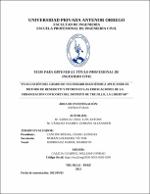Evaluación del grado de vulnerabilidad sísmica aplicando el método de benedetti y petrini en las edificaciones de la urbanización Covicorti del distrito de Trujillo, la libertad

Ver/
Descargar
(application/pdf: 10.82Mb)
(application/pdf: 10.82Mb)
Fecha
2021Autor(es)
Sabogal Díaz, Luis Antony
Vásquez Pajares, Germán Alexander
Metadatos
Mostrar el registro completo del ítemResumen
En el presente informe de investigación se realizó el estudio muestral de tres edificaciones,
escogidas estratégicamente, de la urbanización Covicorti ubicada en el distrito de Trujillo,
provincia de Trujillo, departamento de La Libertad, con el propósito de diagnosticar la
vulnerabilidad sísmica para todo el conjunto habitacional, apoyado conjuntamente con lo
establecido en el Reglamento Nacional de Edificaciones (E.030, “Diseño Simorresistente”) y
métodos de análisis estructurales, los cuales preverán si llegase a existir pérdidas materiales y/o
en el peor de los casos, humanas.
Se utilizan dos métodos factibles como son el cualitativo y cuantitativo. El primero trata de la
metodología de los investigadores italianos Benedetti y Petrini, el cual determina el índice de
vulnerabilidad en función a las diferentes tipologías estructurales y no estructurales que influyen
en el comportamiento sísmico de la edificación. Fue necesario elaborar un formulario de apoyo
para una descripción más exacta de las viviendas. El segundo método fue el computacional
realizado a partir de datos exactos como el dimensionamiento estructural de la edificación,
resistencia a la compresión del concreto, etc.; este método determina cuan vulnerable puede
llegar a ser la estructura a través del cálculo de las derivas.
Luego de aplicar la metodología Benedetti – Petrini a las edificaciones, obtuvimos resultados
para la VIVIENDA 01, VIVIENDA 02 y VIVIENDA 02 con un índice de vulnerabilidad (Iv) de
112.5, 92.5 y 162.5, respectivamente, que luego siendo promediadas resolvimos que, solo a
través de este método, la urbanización tiene una vulnerabilidad de MEDIA A BAJA.
Para el análisis computacional, siendo este un análisis dinámico lineal, se constató perjudiciales
problemas en el cumplimiento de las derivas de entrepiso, siendo las más desfavorables para cada
edificación en el sentido del eje X. Para la VIVIENDA 01, VIVIENDA 02 y VIVIENDA 02
obtuvimos derivas críticas en el tercer piso de 0.0209, cuarto piso de 0.0113 y segundo y tercer
piso de 0.0071, respectivamente, superando considerablemente lo establecido en la norma, razón
por la cual determinamos que para este método la vulnerabilidad es de MEDIA A ALTA.
Contrastando resultados y tomando en cuenta diversos factores de evaluación, concluimos en que
las edificaciones de la urbanización Covicorti poseen una vulnerabilidad de MEDIA A ALTA.
Cabe recalcar que la solicitación sísmica de la norma incrementada a través de los años, ponen en
riesgo a edificaciones antiguas, ya que antes los parámetros sísmicos no eran tan exigentes. In this research report, a sample study of three buildings, strategically chosen, of the Covicorti
urbanization located in the district of Trujillo, province of Trujillo, department of La Libertad,
was carried out, in order to diagnose the seismic vulnerability for the entire complex, housing,
supported jointly with the provisions of the National Building Regulations (E.030, ““Earthquake
Resistant Design““) and structural analysis methods, which will foresee if there were to be
material losses and / or in the worst case, human.
Two feasible methods are used such as qualitative and quantitative. The first deals with the
methodology of the Italian researchers Benedetti and Petrini, which determines the vulnerability
index based on the different structural and non-structural typologies that influence the seismic
behaviour of the building. It was necessary to develop a support form for a more accurate
description of the dwellings. The second method was the computational one made from exact
data such as the structural dimensioning of the building, resistance to compression of the
concrete, etc.; this method determines how vulnerable the structure can become by calculating
the drifts.
After applying the Benedetti - Petrini methodology to the buildings, we obtained results for
HOUSING 01, HOUSING 02 and HOUSING 02 with a vulnerability index (Iv) of 112.5, 92.5
and 162.5, respectively, which after being averaged we resolved that, only at Through this
method, the urbanization has a vulnerability from MEDIUM TO LOW.
For the computational analysis, this being a linear dynamic analysis, harmful problems was
found in the compliance of the mezzanine drifts, being the most unfavourable for each building
in the sense of the X axis. For HOUSING 01, HOUSING 02 and HOUSING 02 we obtained
critical drifts in the third floor of 0.0209, fourth floor of 0.0113 and second and third floor of
0.0071, respectively, considerably exceeding what is established in the standard, which is why
we determined that for this method the vulnerability is MEDIUM TO HIGH.
Contrasting results and taking into account various evaluation factors, we conclude that the
buildings in the Covicorti urbanization have MEDIUM TO HIGH vulnerability. It should be
noted that the increased seismic requirements of the standard over the years put old buildings at
risk, since before the seismic parameters were not so demanding
Palabras clave
Colecciones
- Ingeniería Civil [1260]

